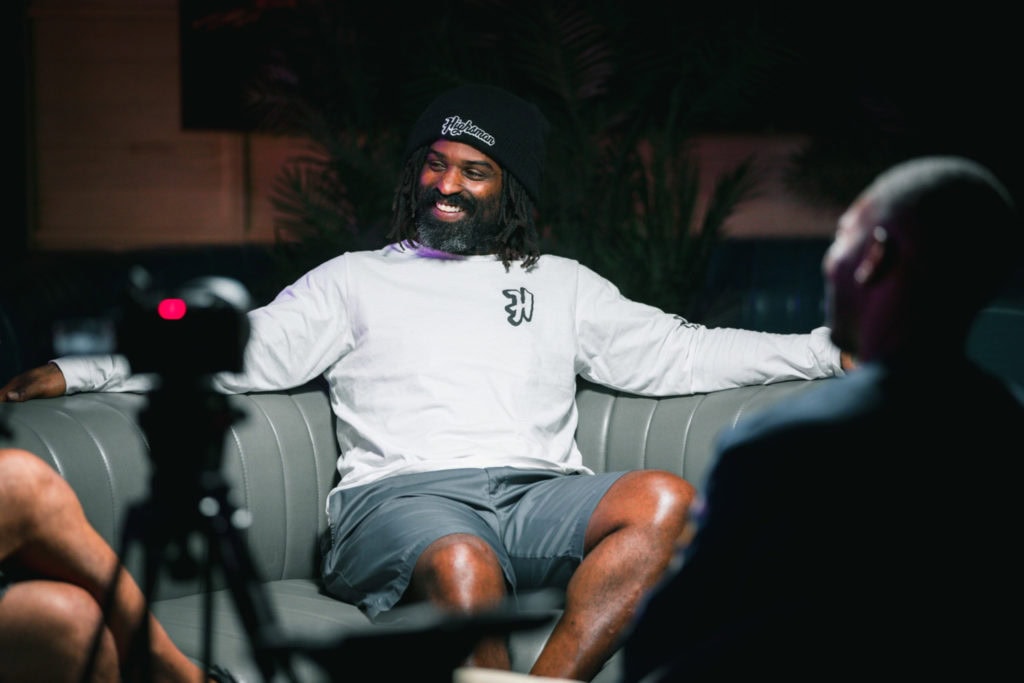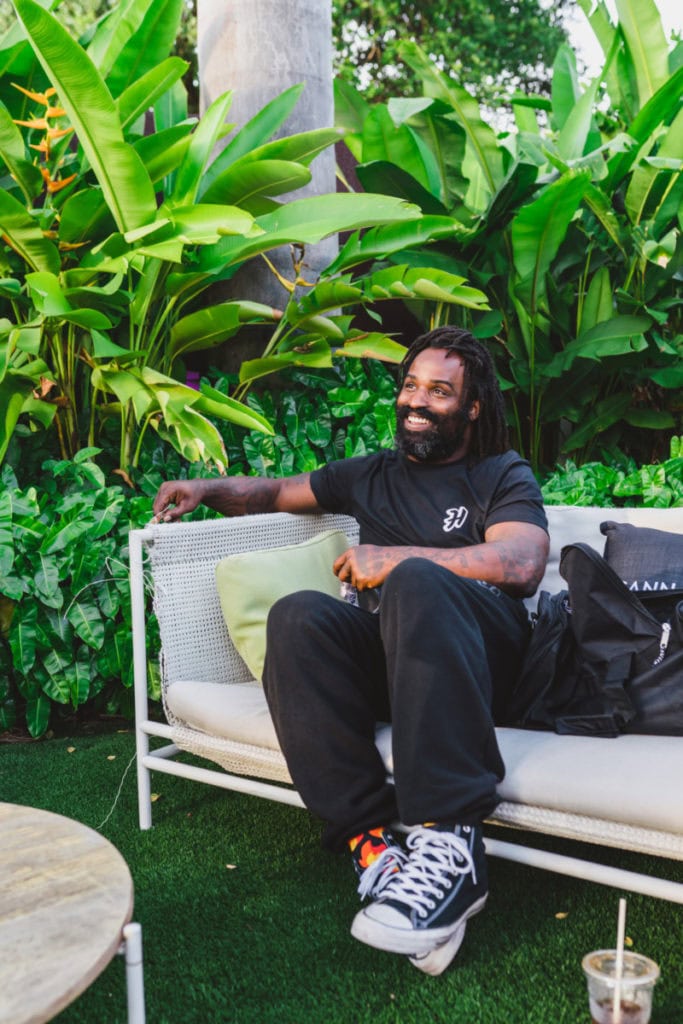The 1998 Heisman Trophy winner discusses his cannabis journey that led him to create Highsman and live events like he held last week in New York.
With 4:56 left in the first quarter on Monday Night Football last week between the New England Patriots and the Arizona Cardinals from Glendale, New England faced a first and 10 from its own 3-yard line when running back Rhamondre Stevenson rushed up the middle for four yards. At the same time, about 2,500 miles northeast of State Farm Stadium, former NFL All-Pro running back Ricky Williams held court on the 12th floor of a Manhattan office building hosting an event for his cannabis lifestyle company Highsman as part of his live, in-person Highsman House series.
The Monday Night Football Smoke Sesh began outside the Work N Roll private co-working space, where guests were handed a small bag of branded Highsman flower, with rolling papers found on nearly every surface inside a large room filled with tables and couches lined with merch and snacks. On a cozy black couch facing a large screen showing the game, the 45-year-old was asked how consuming cannabis changes the way he looks at and thinks about football, the sport that allowed him to win the 1998 Heisman Trophy at the University of Texas, got him drafted fifth overall by the New Orleans Saints in 1999, and caused him to be suspended from the NFL multiple times for cannabis use.
“When I consume cannabis, I get more focused on the little details,” Williams told Boardroom. “So it becomes more interesting.”
It really became more interesting when Williams described what he saw on that Stevenson run against the Cardinals.
“Because I played running back, I know the zone,” Williams said. “So he [Stevenson] did a good job pressing the hole and reading the play. The linebackers did a good job, and the defense did a good job bringing the safety down to come and fill that hole. If I wasn’t high, I’d just say ‘that was a nice running play,’ but I was able to observe a lot of different moving pieces and integrate it really quickly. I just paid more attention and noticed more.”

After spending three seasons in New Orleans, he was traded to the Miami Dolphins prior to the 2002 season, when he won the rushing title. But due to a series of failed drug tests, Williams retired from the NFL in 2004 and was suspended again for the entire 2006 season.
“When I retired in 2004, I started to believe the story that I threw my life away,” Williams said. “And then I was like, ‘wait a minute, I’m the one who decides what happens.'”
Williams spent five more seasons in the NFL, four with Miami and the 2011 season with Baltimore. He launched Highsman last year to provide sports fans and herb enthusiasts a platform to own their relationship with cannabis to, as its slogan says, spark greatness.
To promote the brand, which includes flower and apparel offerings, Williams visits dispensaries in different cities for meet-and-greets. Now, these live events at night will supplement those appearances, allowing for more intimate and meaningful connections and experiences, encountering interesting people from different fields and walks of life with different perspectives and ideas.
“I love podcasts because I feel like my personality and what’s important to me comes out in long form,” Williams said. “So being able to hang in a room like this and sit down with someone and really be able to connect and talk is when I’m at my best.”
These events will be a growing part of Highsman’s business plan in 2023 as cannabis social clubs spread across the country beyond Los Angeles, Las Vegas, and New York. A similar event to the NYC version will take place next month in Massachusetts.
“Americans are used to the sports bar, so this is a similar kind of thing where you can come and consume with other people and enjoy sports together,” Williams said. “This concept allows people to relax and create. There’s the power of the plant that’s also great for creativity. Everyone is more relaxed, open, and talking. That’s the magic happening. Most of us, our favorite songs, our parents’ favorite songs, were probably written or created in an altered state.”
While Williams said he never played in a game high, he once practiced on cannabis during his 2006 weed suspension. He was playing in the Canadian Football League that year for the Toronto Argonauts, nursing a broken arm and an Achilles injury at the time. When it rained, the Argos had to travel 45 minutes to an indoor facility to practice.
Williams clearly wasn’t going to play with his ailments but was just trying to stay active, fit, and engaged. On the drive to practice, a few of his teammates were passing a blunt around, and he partook.
“I noticed when I practiced,” Williams recalled, “I felt like I was in middle school again. I remember having so much fun and wasn’t thinking about my hurt arm or my hurt Achilles. I remember having a blast. When I was a kid playing football, there wasn’t all the pressure, stress, and the expectations. You felt lucky to be out there running around. For me, in my NFL career, I hadn’t had that feeling in such a long time. Having that feeling that day really hit something.”

Having cannabis in his life ultimately made Williams feel good and made his life better, consequences be damned.
“Things make more sense to me when I’m using this,” he said. “I got to the point where I valued that feeling of things making more sense than the money, the football, and the fame.”
That childlike joy of playing without the pressure and expectations that he had in middle school and briefly relived in Toronto is an attitude he carries over into his life as a cannabis entrepreneur. When Williams is in a good mood and happy, he said, he’s at his most focused, concentrated, and creative.
He’s able to keep an open mind and live his truest life, something he wasn’t able to do during his playing career.
“So much of what I hated about in the NFL is that I had to hide who I really was in order to be famous,” Williams said. “Now I’m trying to turn that on its head and make being who you are your true value, not how well you can pretend to do something else.”
Williams’ goal for Highsman in 2023 is simple: To help touch people’s lives. If he’s meeting someone or talking to them, he can give them an experience they’ve never had before. That’s something Williams wants the Highsman brand to embody moving forward, and it all stemmed from the change in mindset he had at his lowest moment.
“I said the way I live my life is going to determine the stories people tell about me,” he said. “That shift was so important, and I want Highsman to help people feel more empowered.”
Live social events, where plenty of ideas, perspectives, and cannabis are exchanged, will be a major key in the months ahead in how Highsman will attempt to spark greatness.
Read More:
- Boardroom’s Picks: The 25 Most Anticipated Movies of 2026
- Why Daniel Lopatin’s ‘Marty Supreme’ Score Is One of the Year’s Most Unexpected Releases
- Winner Takes Millions: The 2026 FIFA World Cup’s $727M Jackpot
- Why the SEC Lost Its Dominant Position Over College Football
- Predator or F50? Adidas Reopens Football’s Oldest Debate